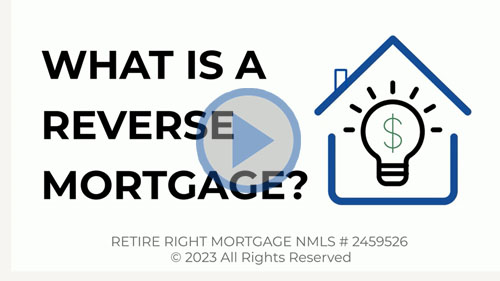Financial Advisors and CPAs
Add Home Equity to Your Retirement Planning Toolkit
Your 62 and older clients may have far more financial flexibility than meets the eye. This age group has trillions of dollars in home equity. A reverse mortgage can help shield the assets under your management from sequence of returns risk.
Why You Should Consider Reverse Mortgage Loans
$11 Trillion in Home Equity
Home equity for 62 and older Americans hit record highs in the third quarter of 2022. While home equity is great, it is also an illiquid asset. Eligible clients can convert a portion into tax-free cash.
Monthly Mortgage Payments
40% of 62+ Americans still make monthly mortgage payments. With a reverse mortgage, borrowers only need to pay property charges such as taxes, insurance, applicable association dues and home upkeep.
Uncertain Economy
Inflation continues to impact both businesses and consumers, world events are affecting markets, and recession remains possible. Home equity can be a financial safety net for many.
Funding for Strategic Plans
As a financial professional, there are numerous strategies that you would like to implement to protect your clients in retirement. The proceeds from a reverse mortgage can help fund them.
What Is a Reverse Mortgage Loan?
The most common reverse mortgage is the Home Equity Conversion Mortgage (HECM). Here are some quick facts about how they work:
-
Federal Housing Administration (FHA) insured
-
Non-recourse loans
-
Borrowers retain full home ownership
-
Proceeds are tax free
-
Unique repayment features
Want to Dive Deeper Into the Benefits?
Increase Client Net Worth*
Studies using Monte Carlo simulations have shown that client net worth is nearly twice as likely to be larger after 30 years of retirement, when using a coordinated withdrawal strategy, which includes home equity as a source of withdrawals during periods of market decline, compared with conventional strategies that do not incorporate home equity.1 Delaying portfolio withdrawals in the early years can also increase net worth for retirement. As the sequence of returns and withdrawals can have a huge impact on the future value of the investment portfolio, it could make sense to withdraw from home equity at the beginning of retirement instead of depleting the portfolio early on during retirement.
Minimize Income Taxes*
Funds received from home equity loans are not considered taxable income. Reverse mortgages are home equity loans that do not require monthly payments. Replacing taxable withdrawals from an IRA or 401(k) with funds from a reverse mortgage can lower taxable income and reduce or eliminate taxes on Social Security income. After interest charges accumulate on the loan balance, payments can be made during high-tax years that should result in home mortgage interest deductions when it make sense for the client. A reverse mortgage also reduces a taxable estate, which is something to consider if your portfolio value will exceed the exempt limit.*
Maximize Client Portfolio Longevity*
Studies using Monte Carlo simulations have shown that spending and withdrawal success over a 30-year period is nearly twice as likely when using a coordinated withdrawal strategy, which includes home equity as a source of withdrawals during periods of market decline, compared with conventional strategies that do not incorporate home equity.1 As you probably know, the sequence of returns and withdrawals can have a huge impact on the future value of the investment portfolio.
Roth Conversions*
With tax rates likely to increase in the future, it could be a smart financial decision for your clients to convert to a Roth IRA from a traditional 401(k) or IRA and pay taxes in a single lump sum during retirement. The challenge is finding the cash to pay the taxes without liquidating assets in the account. A reverse mortgage can provide access to housing wealth to pay the taxes and make this option feasible.*
A Growing Line of Credit
Reverse mortgage loans offer a number of payout types, and one in particular has a unique growth feature that can help preserve your clients’ retirement funds. With a reverse mortgage line of credit, any unused portion grows through the duration of the loan, providing additional funds over time.
Long Term Care (LTC)
The costs of LTC are staggering, and unfortunately, 70% of people over the age of 65 will require LTC during their lifetime. The proceeds from a reverse mortgage loan can fund a variety of strategies to help cover the costs of LTC and protect your clients’ retirement assets.
Let’s Discover What a Reverse Mortgage Can Do for Your Clients
Fill out this form or call us at 800-677-9844.
*This advertisement does not constitute tax advice. Please consult a tax advisor regarding your specific situation. The homeowner is still responsible for paying property taxes, homeowner’s insurance, applicable association dues, and for maintaining the property.


